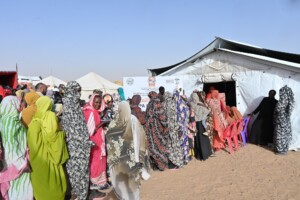‘AUHIP role in Sudan’s pre-dialogue meeting played out’: media expert
The latest announcement by the Sudanese government to reject preparatory peace negotiations abroad, a proposal which was made by the chairman of the AU High-level Implementation Panel (AUHIP) Thabo Mbeki, will mean “the end of the road for Mbeki”.
Media expert and editor for El Ayyam newspaper, Mahjoub Mohamed Saleh, told Radio Dabanga on Monday that the rejection of Mbeki’s proposal depreciates the African Union’s possible role as a mediator in a preparatory meeting attended by the Sudanese government.
Mbeki visited Khartoum last week where he discussed the proposal of merging the peace negotiations on the conflict states South Kordofan and Blue Nile, and the Darfur region, with a broad national dialogue to be convened in Addis Ababa.
The AUHIP chairman, Mohamed Saleh said he was surprised to hear that the government does not accept holding a dialogue abroad and re-affirmed that all national dialogues must take place inside Sudan.
“Mbeki will not rush into submitting a report to the Security Council, but will enter into a second negotiation round with the armed and civil opposition, and will try to act as the government suggested,” Saleh said. The AUHIP plans to meet with the Sudan Revolutionary Front rebel alliance later in August to discuss the peace negotiations as well as the national dialogue called for by President Al Bashir in January last year.
This preparatory national dialogue meeting was insisted on by the opposition Sudan Appeal signatories. Sudan’s ruling NCP party, however, did not participate in a planned meeting in Addis Ababa in March this year. Other Sudanese opposition parties still refuse to join the national dialogue, unless the government abolishes all laws that restrict freedoms in Sudan and releases all political detainees.
The media expert admitted that “there is nothing to be developed because the positions are hugely varied. But he claimed that Mbeki is still hopeful that he might change the government’s position that dialogues should be held at home.
“The question remains, is the government willing to release the political detainees, and will it hold to a cease-fire [with the armed rebel groups]? If it responds to these requirements, a diplomatic move can happen.”
The latest announcement by the Sudanese government to reject preparatory peace negotiations abroad, a proposal which was made by the chairman of the AU High-level Implementation Panel (AUHIP) Thabo Mbeki, will mean “the end of the road for Mbeki”.
Media expert and editor for El Ayam newspaper, Mahjoub Mohamed Saleh, told Radio Dabanga on Monday that the rejection of Mbeki’s proposal depreciates the African Union’s possible role as a mediator in a preparatory meeting attended by the Sudanese government.
Mbeki visited Khartoum last week where he discussed the proposal of merging the peace negotiations on the conflict states South Kordofan and Blue Nile, and the Darfur region, with a broad national dialogue to be convened in Addis Ababa.
Mohamed Saleh said that the AUHIP chairman was surprised to hear that the government does not accept holding a dialogue abroad and re-affirmed that all national dialogues must take place inside Sudan.
“Mbeki will not rush into submitting a report to the Security Council, but will enter into a second negotiation round with the armed and civil opposition, and will try to act as the government suggested,” Saleh said.
The AUHIP plans to meet with the Sudan Revolutionary Front rebel alliance later in August to discuss the peace negotiations as well as the national dialogue called for by President Al Bashir in January last year.
This preparatory national dialogue meeting was insisted on by the opposition Sudan Appeal signatories. Sudan’s ruling NCP party, however, did not participate in a planned meeting in Addis Ababa in March this year. Other Sudanese opposition parties still refuse to join the national dialogue, unless the government abolishes all laws that restrict freedoms in Sudan and releases all political detainees.
The media expert admitted that “there is nothing to be developed because the positions are hugely varied. But he claimed that Mbeki is still hopeful that he might change the government’s position that dialogues should be held at home.
“The question remains, is the government willing to release the political detainees, and will it hold to a cease-fire [with the armed rebel groups]? If it responds to these requirements, a diplomatic move can happen.”











 and then
and then